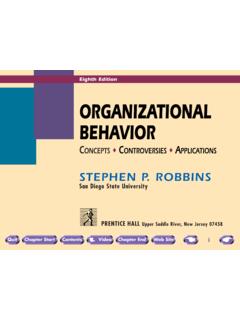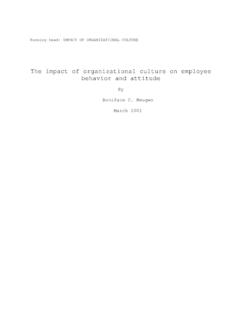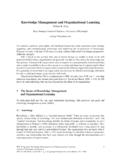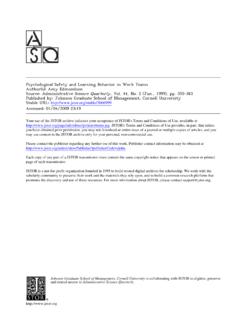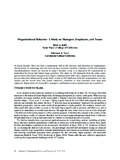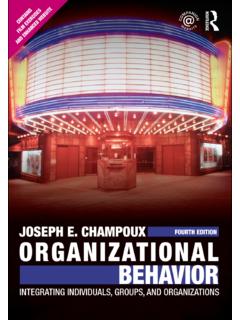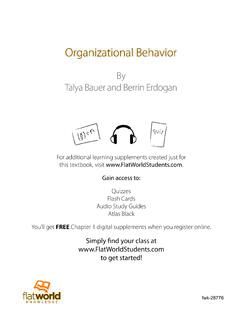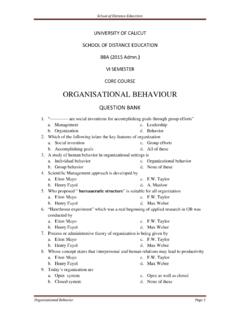Transcription of Concept based notes Organizational Behavior
1 Biyani's Think Tank Concept based notes Organizational Behavior MBA-I Sem Shalini Singh Revised by:Surbhi Mathur Deptt. of Management Biyani Institute of Science and Management, Jaipur 2 Published by : Thi nk Tanks Biyani Group of Colleges Concept & Copyright : Biyani Shi kshan Samiti Sector-3, Vidhyadhar Nagar, Jaipur-302 023 (Rajasthan) Ph : 0141-2338371, 2338591-95 Fax : 0141-2338007 E-mail : Website ; Edition : 2012 Leaser Type Setted by : Biyani College Printing Department While every effort is taken to avoid errors or omissions in this Publication, any mistake or omission that may have crept in is not intentional. It may be taken note of that neither the publisher nor the author will be responsible for any damage or loss of any kind arising to anyone in any manner on account of such errors and omissions.
2 Organisational Behaviour 3 Preface I am glad to present this book, especially designed to serve the needs of the students. The book has been written keeping in mi nd the general weakness in understanding the fundamental concepts of the topics. The book is self-explanatory and adopts the Teach Yourself style. It is based on question-answer pattern. The language of book is quite easy and understandable based on scientific approach. Any further improvement in the contents of the book by making corrections, omission and inclusion is keen to be achieved based on suggestions from the readers for which the author shall be obliged. I acknowledge special thanks to Mr. Rajeev Biyani, Chairman & Dr. Sanjay Biyani, Director (Acad.)
3 Biyani Group of Colleges, who are the backbones and main Concept provider and also have been constant source of moti vation throughout this Endeavour. They played an active role in coordinating the various stages of this Endeavour and spearheaded the publishi ng work. I look forward to recei ving valuable suggestions from professors of various educational institutions, other faculty members and students for improvement of the quality of the book. The reader may feel free to send in their comments and suggestions to the under mentioned address. Shalini Singh Surbhi Mathur 4 Contents Title of Chapter 1 Organizational Behavior 2 Individual Behavior & Managing Diversity 3 Motivation 4 Communication 5 Group Behavior 6 Conflict and Stress Management 7 Management of C hange 8 Key Terminologies Annexure 1.
4 Bibliography 2. Solved question papers Organisational Behaviour 5 Syllabus The paper aims to present the basic concepts of management. The objective is to help student comprehend perceive and understand dynamic nature of groups. Provide on insight into Behavior of individuals in organization and the changing environment of organization. This is with a view to enable him to develop and adopt effective strategies to influence it. It also aims to help the student develop decision making skills through case discussions. Section A Organizational Behavior Definition assumptions.,- Historical Background Fundamental concepts of Ob, research foundation, trends, impact of globalization, learning organization and Knowledge management.
5 Individual Behavior and managing diversity, individual Behavior , main reasons impact, trends and layers of diversity, initiatives. Personality Development: meaning, theories of Personality development, managerial consideration for further developing of personality development of employee. Perception Meaning and definition, Perceptual process, Managerial implications of perception in business situations, schemas, perceptual errors. Motivation; nature and importance, basic process, need theories of motivation- the Concept of needs, Maslow s hierarchy of needs theory, Alderfer s ERG theory, McClelland s Achievement Motivation theory, Cognitive and behavioral theories- expectancy, Equity, Goal - Setting theories. Communication: Meaning, importance, process, types, effective and efficient communication, barriers in communication.
6 Group Behavior ; Group formation: formal and informal group, stages of group development, group decision making, group effectiveness and self managed teams. Conflict and stress management: meaning, process, functional and dysfunctional conflict, conflict handling, nature causes and consequences of stress. Management of change: Concept , Lewin s stages of change, forces of change, resistance of change, and managing planned change. 6 Section-B Case study. 1. Dean, Rajasthan Technical university,Kota/ 2008-2009/Prof. Surendra Kumar Vyas, Chairman BoS, Department of Management & technology, Engineering College, Bikaner. Organisational Behaviour 7 Organizational Behavior Define Organizational Behavior ?
7 Ans. " Organizational Behavior is a field of study that investigates the impact that individuals, groups and structure have on Behavior within organization for the purpose of applying such knowledge toward improving an organization's effectiveness." - Stephen P. Robbins " Organizational Behavior can be defined as the understanding; prediction and management of the human Behavior affect the performance of the organizations. - Luthans In brief Organizational Behavior is concerned with the study of what people do in an organization and how their Behavior affects the performance of the organizations. Organizational Behavior is a scientific discipline in which a large number of research is conducted which improve its knowledge base.
8 Why Organizational Behavior is significant. Explain? Ans. Organizational Behavior offers several ideas to management as to how human factor should be properly emphasized to achieve Organizational objectives. Organizational Behavior provides opportunity to management to analyze human Behavior and prescribe means for shaping it to a particular direction. Organizational Behavior helps to analyze 'why' and 'how' an individual behaves in a particular way. Human Behavior is a complex phenomenon and is affected by a large number of factors including the psychological, social and cultural implications. Organizational Behavior integrates these factors to provide simplicity in understanding the human Behavior . Interpersonal Level: Human Behavior can be understood at the level of interpersonal interaction.
9 Organizational Behavior provides means for understanding the interpersonal relationships in an organization. Group Level: Though people interpret anything at their individual level, they are often modified by group pressures, which then become a force in shaping human Behavior . Thus individuals should be studied in groups also. Inter-group Level: The organization is made up of many groups that develop complex relationships to build their process and substance. Understanding the 8 effect of group relationships is important for managers in today's organization. Inter-group relationship may be in the form of co-operation or competition. Controlling and Directing Behavior : After understanding the mechanism of human Behavior , managers are required to control and direct the Behavior so that it conforms to the standards required for achieving the Organizational objectives.
10 Thus, managers are required to control and direct the Behavior at all levels of individual interaction. Use of Power and Sanction: The behaviors can be controlled and directed by the use of power and sanction, which are formally defined by the organization. Power is referred to as the capacity of an individual to take certain action and may be utilized in many ways. Organizational Behavior explains how various means of power and sanction can be utilized so that both Organizational and individual objectives are achieved simultaneously. Leadership: Organizational Behavior brings new insights and understanding to the practice and theory of leadership. Thus, managers can adopt styles keeping in view the various dimensions of organizations, individuals and situations.








